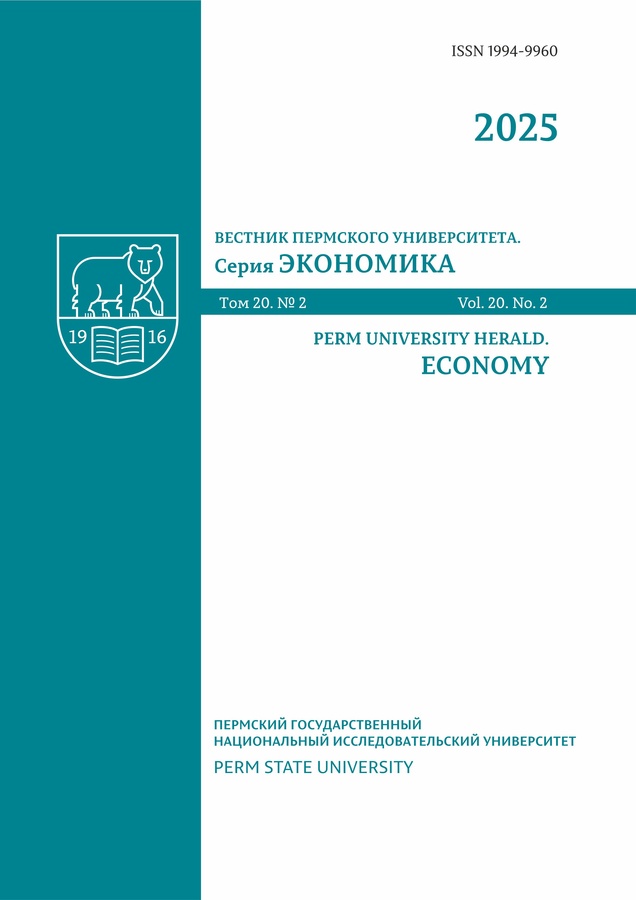Prospects for import substitution from the development of industrial specialization in the Russian regions
- Authors: Bikmaeva A.D.1
-
Affiliations:
- Ufa University of Science and Technology
- Issue: Vol 20, No 2 (2025)
- Pages: 163-179
- Section: Regional and Industrial Economics
- URL: https://journal-vniispk.ru/1994-9960/article/view/351460
- DOI: https://doi.org/10.17072/1994-9960-2025-2-163-179
- EDN: https://elibrary.ru/CYNJIX
- ID: 351460
Cite item
Full Text
Abstract
About the authors
A. D. Bikmaeva
Ufa University of Science and Technology
Email: rakhmatullinaad@gmail.com
SPIN-code: 764778
Candidate of Sciences (Economics), Associate Professor, Associate Professor at the Department of Economic Theory and Regional Development, Institute of Economics, Management and Business 32, Zaki Validi st., Ufa, 450076, Russia
References
- Karanina E. V., Karaulov V. M. Differentiated approach to the diagnostics of economic security and resilience of Russian regions (case of the Volga federal district). R-Economy, 2023, vol. 9, no. 1, pp. 19–37. doi: 10.15826/recon.2023.9.1.002. EDN WPDXXU
- Ershov P. А. Import substitution and import replacement policy: A theoretical approach to the definition of these concepts. Vestnik Instituta Ekonomiki Rossiyskoy Akademii Nauk, 2017, no. 2, pp. 147–157. (In Russ.). EDN YFPSJD
- Golosova A., Iavorskii S. Forecasts for the development of industry and production for the formation of import substitution. Studencheskii, 2023, no. 25-2 (237), pp. 63–68. EDN BTPHFV
- Temrokova А. Kh. Import substitution in modern conditions of overcoming of economic sanctions. Nauchnye izvestiya, 2017, no. 7, pp. 42–47. (In Russ.). EDN ZCITJV
- Zubarevich N. V. Regions of Russia at the end of 2023: Have they managed to overcome the crisis recession? Voprosy teoreticheskoy ekonomiki, 2024, no. 1 (22), pp. 34–47. (In Russ.). doi: 10.52342/2587-7666VTE_2024_1_34_47. EDN FLKGYM
- Zyuzin А. V., Demidova О. А., Dolgopyatova Т. G. Localization and diversification of Russian economy: Regions’ and industries’ peculiarities. Prostranstvennaya ekonomika = Spatial Economics, 2020, vol. 16, no. 2, pp. 39–69. (In Russ.). doi: 10.14530/se.2020.2.039-069. EDN CBKNOO
- Kolomak E. A. Evolution of spatial distribution of economic activity in Russia. Regional Research of Russia, 2015, vol. 5, no. 3, pp. 236–242. doi: 10.1134/S2079970515030065. EDN UZZKVX
- Krugman P. Increasing returns and economic geography. Journal of Political Economy, 1991, vol. 99, no. 3, pp. 483–499. doi: 10.1086/261763
- Porter M. E. The Competitive Advantage of Nations. New York, The Free Press, 1990. 855 p.
- Bikmaeva А. D. Determination of the region’s specialization industries. Вulletin USPTU. Science, еducation, еconomy. Series еconomy, 2023, no. 4 (46), pp. 76–83. (In Russ.). doi: 10.17122/2541-8904-2023-4-46-76-83. EDN RFQVCG
- Rastvortseva S. N., Kuga Ya. Т. Regional specialization and geographic concentration of the industry in Russia. Nauchnye vedomosti Belgorodskogo gosudarstvennogo universiteta. Seriya: Ekonomika. Informatika, 2012, no. 13 (132), pp. 37–46. (In Russ.). EDN RKNIGF
- Kutsenko E., Eferin Y. “Whirlpools” and “Safe Harbors” in the dynamics of industrial specialization in Russian regions. Foresight and STI Governance, 2019, vol. 13, no. 3, pp. 24–40. doi: 10.17323/2500-2597.2019.3.24.40. EDN UYBANG
- Rikardo D. Nachala politicheskoi ekonomii i podatnogo oblozheniya. Moscow, Yurait Publ., 2025. 310 p. (In Russ.).
- Ellison G., Glaeser E. L. Geographic concentration in US manufacturing industries: A dartboard approach. Journal of Political Economy, 1997, vol. 105, no. 5, pp. 889–927. doi: 10.1086/262098
- Lu Zh., Deng X. Regional specialization: New methods of measurement and the trends in China 1987–2007. Applied Econometrics and International Development, 2017, vol. 17, iss. 2, pp. 119–134.
- Rastvortseva S. N., Snitko L. Т. Regional specialization and agglomeration effects in the Russian economy. Economic and Social Changes: Facts, Trends, Forecast, 2020, vol. 13, no. 3, pp. 46–58. (In Russ.). doi: 10.15838/esc.2020.3.69.4. EDN KOYPWJ
- Rumyantsev N. M. Promising economic specializations within a macroregion (the case of the Northwestern Federal District). Economic and Social Changes: Facts, Trends, Forecast, 2023, vol. 16, iss. 6, pp. 74–90. doi: 10.15838/esc.2023.6.90.4. EDN GTXUQE
- Kaulich F. Diversification vs. specialization as alternative strategies for economic development: Can we settle a debate by looking at the empirical evidence? Development policy, statistics and research branch. Working paper No. 3/2012. Vienna, UNIDO, 2012. 70 p. doi: 10.13140/RG.2.1.1676.7208
- Kofanov A. A. Metodicheskii podkhod k tipologii regionov po urovnyu diversifitsirovannosti otraslevykh struktur. Regional Economics: Theory and Practice, 2010, no. 2, pp. 27–32. (In Russ.). EDN KYNQDX
- Grebenkin I. V. Trends in industrial specialization and development dynamics in the Russian regions. Ekonomika regiona = Economy of Regions, 2020, vol. 16, no. 1, pp. 69–83. (In Russ.). doi: 10.17059/2020-1-6. EDN ADWOXC
- Hoover E. The measurement of industrial localization. The Review of Economics and Statistics, 1936, vol. 18, no. 4, pp. 162–171. doi: 10.2307/1927875
- Palan N. Measurement of Specialization – The Choice of Indices. FIW Working Paper No. 62. Vienna, FIW – Research Centre International Economics, 2010. 39 p.
- Bikmaeva А. D. Specialization of regional economy: Theoretical and practical aspects. Economics and Management: Research and Practice Journal, 2024, no. 5 (179), pp. 74–79. (In Russ.). doi: 10.34773/EU.2024.5.12. EDN OVOLQK
- Churski P., Kopczewska K., Ochojski A., Polko A. Measuring Regional Specialization: A New Approach. Palgrave Macmillan Cham, 2017. 466 p. doi: 10.1007/978-3-319-51505-2
- Chepliskite I. R., Lukin Е. V. Characterizing export specialization of Northwestern Federal District regions within the framework of the economic complexity concept. Economic and Social Changes: Facts, Trends, Forecast, 2024, vol. 17, no. 2, pp. 81–95. (In Russ.). doi: 10.15838/esc.2024.2.92.4. EDN YKZIAQ
- Zhigalov V. I. Digital economy and import substitution: stages and prospects of development in Russia. Diskussiya = Discussion, 2023, no. 2 (117), pp. 95–106. (In Russ.). doi: 10.46320/2077-7639-2023-2-117-95-106. EDN TJYEZA
- Osipov V. S., Zel'dner A. G., Pankova S. V., Novitskii N. A., Popov V. V., Tsypin A. P., Skryl' T. V., Nevskaya N. A., Evtyukhin A. S. Import substitution economy: Impact assessment of structure of foreign trade commodity flows on development of economic potential and import substitution of the Russian Federation. Intellect. Innovations. Investments, 2017, no. 7, pp. 31–44. (In Russ.). EDN ZRBRTP
Supplementary files








